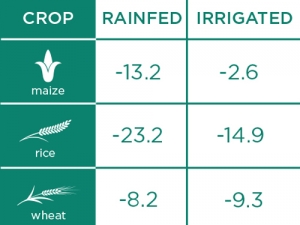Green no more?
OPINION: Your old mate has long dismissed the Greens as wooden bicycle enthusiasts with their heads in the clouds, but it looks like the ‘new Greens’ may actually be hard-nosed pragmatists when it comes to following voters.
 Effect of climate change on average maize, rice and wheat yields in 2050: Based on process-based models (DSSAT) between 2010 and 2050 (%). Source: IFPRI study
Effect of climate change on average maize, rice and wheat yields in 2050: Based on process-based models (DSSAT) between 2010 and 2050 (%). Source: IFPRI study
This year will likely be the hottest on record, according to the World Meteorological Organisation.
Depending on whether you are planning a beach holiday, or trying to keep your grass green, it could be a mixed blessing.
As temperatures continue to rise and extreme weather events such as droughts and floods become more frequent, worldwide farmers face more unpredictable and difficult growing conditions. Now, more than ever, global farmers need plant science technology to help combat climate change.
According to the International Food Policy Research Institute (IFPRI) rice, wheat and maize yields will fall significantly over the next 50 years without the aid of technology including crop protection and biotech traits to tackle climate change (see table).
Drastically reduced crop yields could have a devastating impact on global food security and that's where the plant science industry can help. Here are four technologies that are assisting farmers in many countries mitigate and adapt to climate change:
Heat-Tolerant Traits: The University of Florida has developed heat-tolerant biotech traits that showed yield increases of 38% in wheat, 23% in rice and 68% in maize grown in extreme and unexpected hot conditions.
Drought-Tolerance: For example the Water-Efficient Maize for Africa project is developing biotech traits that maintain and double maize yields in drought conditions.
Crop Protection Products: Climate change is pushing pests and diseases into new geographic areas. Crop protection products help farmers increase their yields despite the evolving threat and unanticipated changes in pest populations.
Nitrogen-Use Efficiency (NUE): Nitrogen fertiliser run-off can find its way into surrounding land and water. NUE traits will enable farmers to apply less nitrogen fertiliser without sacrificing yields.
While farmers worldwide will be challenged with climate change, smallholder farmers in developing countries could be hit the hardest – according to Agriculture for Impact, hunger and child malnutrition in Africa could increase by as much as 20% by 2050 as a result of climate change.
If the global community is to meet the United Nations' ambitious goal to end world hunger by 2030, while also facing up to the challenge of climate change, it will need these plant science tools at its disposal.
· Mark Ross is chief executive of Agcarm, New Zealand's industry association for companies which manufacture and distribute crop protection and animal health products.
The World Wide Sires National All Day Breeds Best Youth Camp Best All Rounder plaudit has become family affair, with 2026 Paramount Cup winner Holly Williams following in her sister Zara's footsteps.
DairyNZ is giving New Zealand farmers a unique opportunity to gain hands-on governance and leadership experience within the dairy sector.
Herd improvement company LIC has posted a 5.2% lift in half-year revenue, thanks to increasing demand for genetics.
According to the latest Fresh Produce Trend Report from United Fresh, 2026 will be a year where fruit and vegetables are shaped by cost pressures, rapid digital adoption, and a renewed focus on wellbeing at home.
The Roar is a highlight of the game hunting calendar in New Zealand, with thousands of hunters set to head for the hills to hunt male stags during March and April.
OPINION: The past few weeks have been tough on farms across the North Island: floods and storms have caused damage and disruption to families and businesses.

OPINION: Meanwhile, red blooded Northland politician Matua Shane Jones has provided one of the most telling quotes of the year…
OPINION: This old mutt has been around for a few years now and it seems these ‘once in 100-year’ weather…